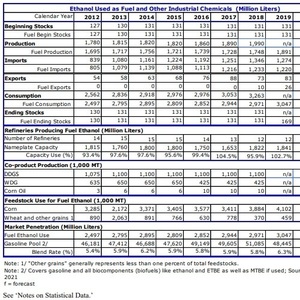Report shows impact of COVID-19 on Canadian ethanol industry

January 18, 2022
BY Erin Voegele
A report recently filed with the USDA Foreign Agricultural Service’s Global Agricultural Information Network illustrates the impact of the COVID-19 pandemic on Canada’s ethanol industry and provides an overview of the country’s draft Clean Fuel Standard.
Canadian ethanol production fell to an eight year low of 1.689 billion liters (446.19 million gallons) in 2020 due to factors associated with COVID-19. Despite a partial recovery in gasoline use projected for 2021, Canadian production of fuel ethanol was estimated to increase only slightly last year, reaching approximately 1.69 billion liters. There was, however, an increase in the production of denatured ethanol for industrial use reported for 2020.
Canada had 12 ethanol refineries as of 2021 with a nameplate capacity of 1.881 billion liters. Capacity use was estimated at 89.8 percent in 2021.
Advertisement
Advertisement
Corn is the primary feedstock for Canadian ethanol production, with an estimated 3.55 metric tons consumed in 2021. An additional 540,000 metric tons of wheat and other grains went to ethanol production last year.
Canada exported approximately 115 million liters of ethanol in 2021, up from 106 million liters in 2020. Ethanol imports were at 1.28 billion liters last year, up from 1.258 billion liters in 2020. Fuel ethanol consumption was at 2.766 billion liters in 2021, up slightly from 2.727 billion liters in 2020, but below the 3.047 billion liters consumed in 2019.
The ethanol blend rate was approximately 6 percent last year, comparted to 6.5 percent in 2020 and 6.3 percent in 2019.
Advertisement
Advertisement
Canada’s Clean Fuel Standard is expected to boost biofuel use in the coming years. The program aims to achieve 30 million tons of annual reductions in greenhouse gas (GHG) emissions by 2030, according to the report.
A draft regulation was published in December 2020, outlining a nationwide framework for adopting a carbon intensity (CI) approach for renewable fuels. The final regulation is expected to be published this spring.
A full copy of the report can be downloaded from the USDA FAS GAIN website.
Related Stories
The USDA on April 14 announced the cancellation of its Partnerships for Climate-Smart Commodities program. Select projects that meet certain requirements may continue under a new Advancing Markets for Producers initiative.
The governors of Iowa, Nebraska, South Dakota and Missouri on April 10 sent a letter to U.S. EPA Administrator Lee Zeldin urging the agency to set higher Renewable Fuel Standard renewable volume obligations (RVOs).
President Donald Trump on April 8 issued an executive order that aims to protect oil, natural gas, coal, hydropower, geothermal, biofuel, critical mineral, and nuclear energy resources from state overreach.
Growth Energy, Clean Fuels respond to oil industry in case pushing EPA to reallocate lost biofuel gallons
Growth Energy and Clean Fuels Alliance America on April 14 filed a reply brief in a case challenging the U.S. EPA for its failure to reallocate gallons lost due to SREs granted after RVOs have been issued under the Renewable Fuel Standard.
The Michigan Advanced Biofuels Coalition and Green Marine are partnering to accelerating adoption of sustainable biofuels to improve air quality and reduce GHG emissions in Michigan and across the Great Lakes and St. Lawrence Seaway.
Upcoming Events










